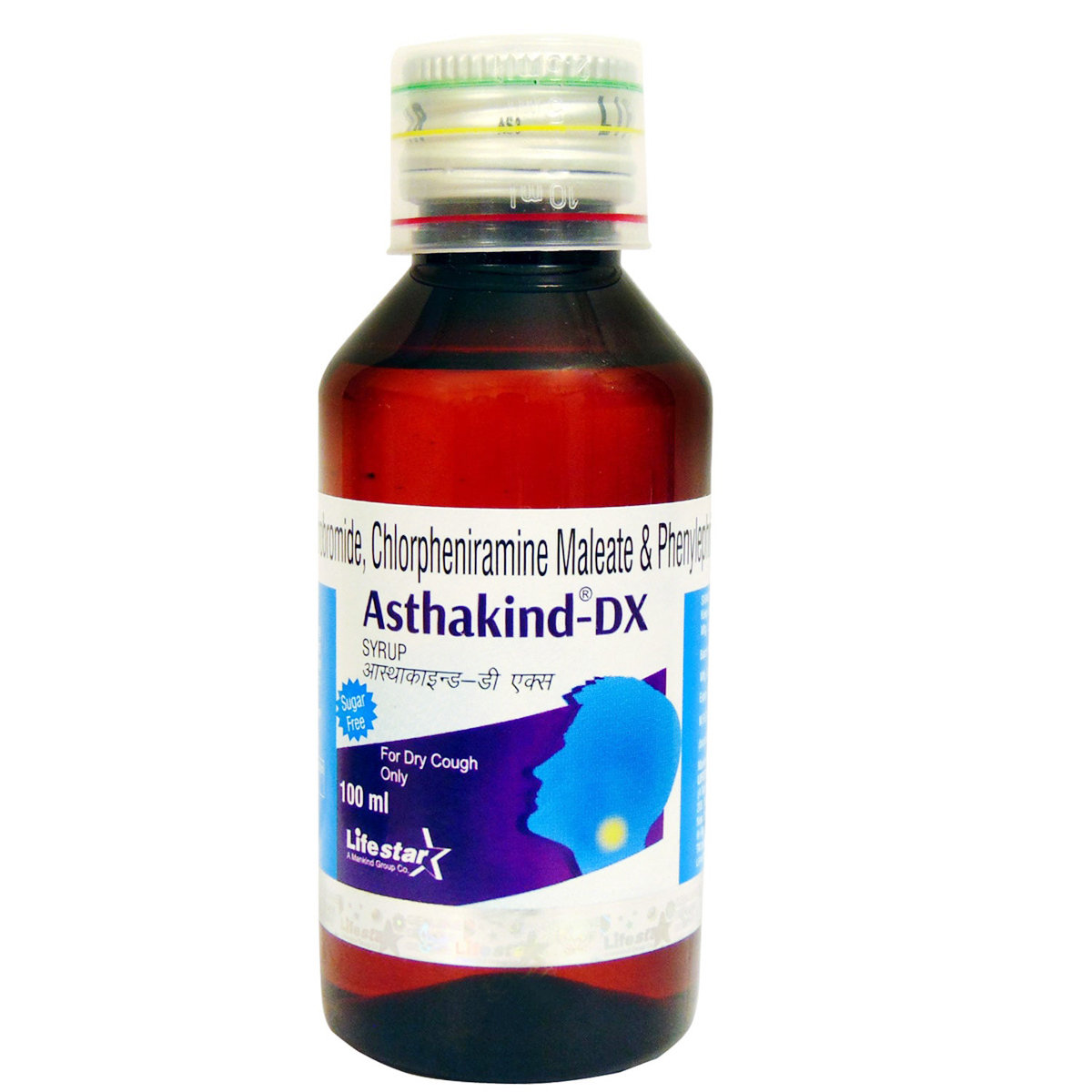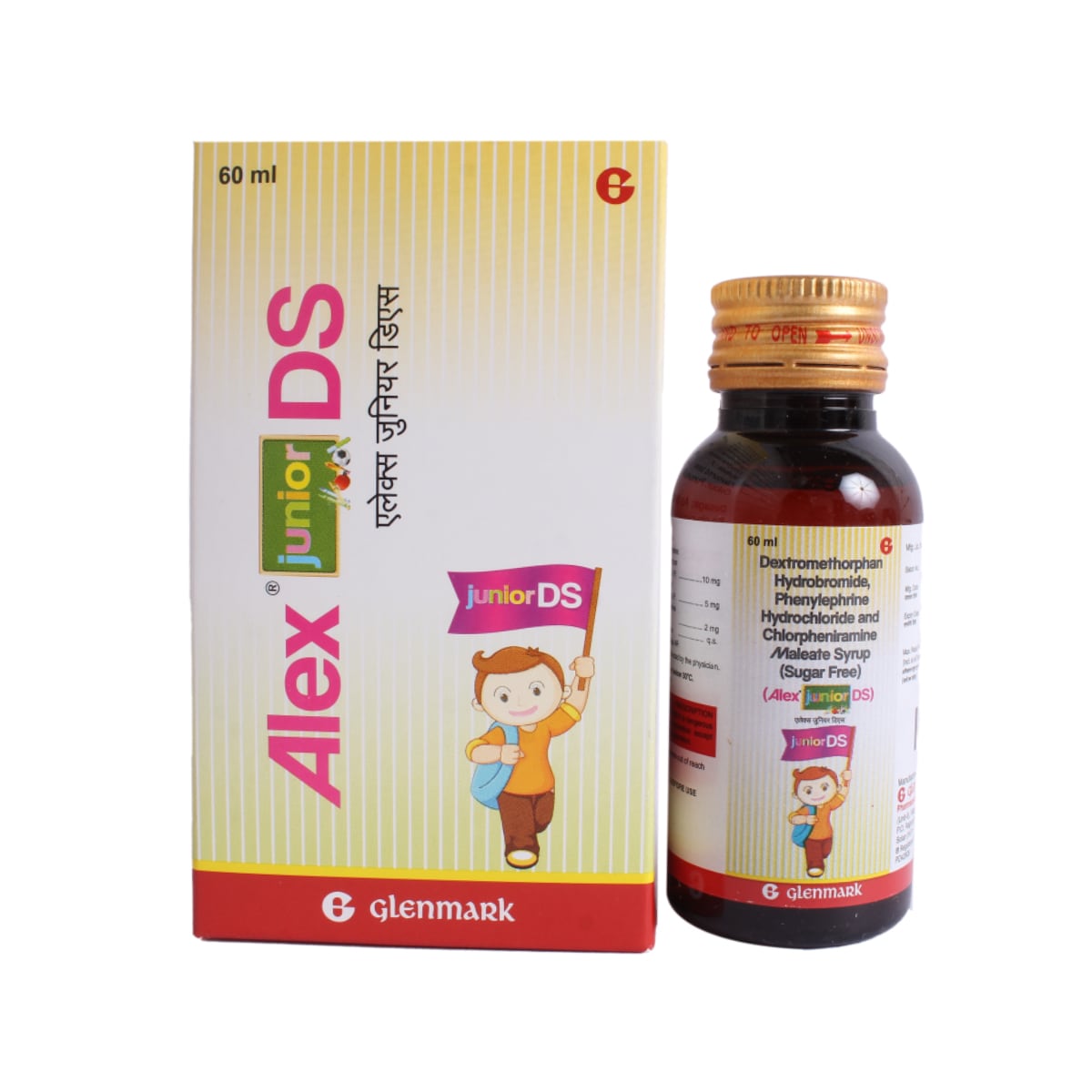Chlorpheniramine Maleate+dextromethorphan Hydrobromide+phenylephrine
About Chlorpheniramine Maleate+dextromethorphan Hydrobromide+phenylephrine
Chlorpheniramine Maleate+dextromethorphan Hydrobromide+phenylephrine belongs to a class of medication called 'cough and cold preparations' primarily used to treat dry cough. Coughing (dry or productive) is the body's way of clearing irritants (like allergens, mucus or smoke) from airways and preventing infection. There are two types of coughs, namely: dry cough and chesty cough. A dry cough is tickly and doesn't produce any vicious or thick mucus, while a chesty cough (wet cough) produces mucous or sputum.
Chlorpheniramine Maleate+dextromethorphan Hydrobromide+phenylephrine contains Chlorpheniramine maleate, Phenylephrine and Dextromethorphan hydrobromide. Chlorpheniramine maleate works by blocking the action of histamine, a substance responsible for causing allergic reactions. Phenylephrine helps shrink the blood vessels located in the nasal passage, thereby reducing the stuffy nose. Dextromethorphan hydrobromide works by blocking the transmission of nerve signals from the cough centre in the brain to the muscles that produce cough. Together, Chlorpheniramine Maleate+dextromethorphan Hydrobromide+phenylephrine helps provide relief from dry cough.
Your doctor will recommend the dose and duration of Chlorpheniramine Maleate+dextromethorphan Hydrobromide+phenylephrine based on your medical condition. Some people may experience dry mouth/throat/nose, drowsiness, blurred vision, constipation, dizziness, restlessness or excitation. Most of these side effects of Chlorpheniramine Maleate+dextromethorphan Hydrobromide+phenylephrine do not require medical attention and gradually resolve over time. However, if the side effects persist or worsen, please consult your doctor.
Consult your doctor if you are pregnant or breastfeeding. Chlorpheniramine Maleate+dextromethorphan Hydrobromide+phenylephrine is not recommended for children below 12 years of age. If you are about to undergo medical tests or surgery, please inform your doctor that you are taking Chlorpheniramine Maleate+dextromethorphan Hydrobromide+phenylephrine. Chlorpheniramine Maleate+dextromethorphan Hydrobromide+phenylephrine may cause dizziness, so drive or operate machinery only if you are alert. Avoid alcohol consumption as it may cause increased dizziness. Keep your doctor informed about your health condition and medications to rule out any interactions/side effects.
Uses of Chlorpheniramine Maleate+dextromethorphan Hydrobromide+phenylephrine
Medicinal Benefits
Chlorpheniramine Maleate+dextromethorphan Hydrobromide+phenylephrine is a combination medicine belonging to a class of drugs called 'cough and cold preparations' primarily used to treat dry cough. Chlorpheniramine maleate works by blocking the action of histamine, a substance responsible for causing allergic reactions. It helps relieve allergy symptoms such as sneezing, running nose, watery eyes, itching, swelling, congestion or stiffness. Phenylephrine is a decongestant that helps shrink the blood vessels located in the nasal passage, thereby reducing the stuffy nose. Dextromethorphan hydrobromide works by blocking the transmission of nerve signals from the cough centre in the brain to the muscles that produce cough. Thus, Chlorpheniramine Maleate+dextromethorphan Hydrobromide+phenylephrine helps relieve cough, cold and allergic symptoms.
Directions for Use
Storage
Side Effects of Chlorpheniramine Maleate+dextromethorphan Hydrobromide+phenylephrine
- Dry mouth, throat or nose
- Drowsiness
- Dizziness
- Blurred vision
- Headache
- Constipation
- Restlessness or excitation
- Loss of appetite
Drug Warnings
If you are allergic to Chlorpheniramine Maleate+dextromethorphan Hydrobromide+phenylephrine or any other medicines, please tell your doctor. Consult your doctor if you are pregnant or breastfeeding. Chlorpheniramine Maleate+dextromethorphan Hydrobromide+phenylephrine is not recommended for children below 12 years of age. Avoid taking Chlorpheniramine Maleate+dextromethorphan Hydrobromide+phenylephrine if you have taken medicines such as linezolid, phenelzine, selegiline, rasagiline, isocarboxazid, tranylcypromine and methylene blue injection in the past 14 days. Inform your doctor if you have glaucoma, urinary problems, enlarged prostate, phenylketonuria (a birth defect that causes accumulation of amino acid, phenylalanine in the body), cough with mucus or cough caused by asthma, smoking, chronic bronchitis or emphysema (a lung condition causing shortness of breath).
Drug Interactions
Drug-Drug Interaction: Chlorpheniramine Maleate+dextromethorphan Hydrobromide+phenylephrine may interact with anti-allergic drugs (diphenhydramine), anti-psychotic (escitalopram, desvenlafaxine, vilazodone), pain killer (aspirin), cold medicines (acetaminophen), antibiotics (amoxicillin), anti-depressants (linezolid, phenelzine, selegiline, rasagiline, isocarboxazid, tranylcypromine), beta-blockers (metoprolol, atenolol), muscle relaxants (carisoprodol, cyclobenzaprine).
Drug-Food Interaction: No interactions found/established.
Drug-Disease Interaction: Inform your doctor if you have liver or kidney disease, asthma, diabetes, glaucoma, cardiovascular diseases, enlarged prostate gland, chronic bronchitis or emphysema (a lung condition causing shortness of breath).
Drug-Drug Interactions Checker List:
Safety Advice

Alcohol
cautionAvoid consumption of alcohol with Chlorpheniramine Maleate+dextromethorphan Hydrobromide+phenylephrine as it may increase drowsiness. Please consult a doctor before consuming alcohol with Chlorpheniramine Maleate+dextromethorphan Hydrobromide+phenylephrine.

Pregnancy
cautionThe safety of Chlorpheniramine Maleate+dextromethorphan Hydrobromide+phenylephrine in pregnant women is unknown. Consult your doctor if you have any concerns; your doctor will prescribe only if the benefits outweigh the risks.

Breast Feeding
cautionIt is unknown whether Chlorpheniramine Maleate+dextromethorphan Hydrobromide+phenylephrine is excreted in human milk. Consult your doctor if you have any concerns; your doctor will decide if Chlorpheniramine Maleate+dextromethorphan Hydrobromide+phenylephrine can be taken by breastfeeding mothers or not.

Driving
cautionChlorpheniramine Maleate+dextromethorphan Hydrobromide+phenylephrine may cause dizziness or drowsiness in some people. Therefore, drive only if you are alert after taking Chlorpheniramine Maleate+dextromethorphan Hydrobromide+phenylephrine.

Liver
cautionTake Chlorpheniramine Maleate+dextromethorphan Hydrobromide+phenylephrine with caution, especially if you have a history of liver diseases/conditions. The dose may be adjusted by your doctor as required.

Kidney
cautionTake Chlorpheniramine Maleate+dextromethorphan Hydrobromide+phenylephrine with caution, especially if you have a history of kidney diseases/conditions. The dose may be adjusted by your doctor as required.

Children
cautionChlorpheniramine Maleate+dextromethorphan Hydrobromide+phenylephrine is not recommended for children below 12 years of age. However, please consult a doctor if you have any concerns.
Habit Forming
Diet & Lifestyle Advise
- Avoid dairy products such as milk as it may increase mucus production. Also, avoid processed or refined foods.
- Drink plenty of fluids to avoid a dry throat. It also helps loosen mucus.
- Avoid citrus fruits as they may worsen the cough.
- Eat fruits rich in water content, such as pears, watermelon, peaches and pineapples.
Special Advise
- Talk to your doctor if your symptoms do not improve even after taking Chlorpheniramine Maleate+dextromethorphan Hydrobromide+phenylephrine for 7 days.
- Contact a doctor immediately if you develop fever, rash or headache after taking Chlorpheniramine Maleate+dextromethorphan Hydrobromide+phenylephrine.
- If you are about to undergo any medical tests or surgery, please inform your doctor that you are taking Chlorpheniramine Maleate+dextromethorphan Hydrobromide+phenylephrine.
Patients Concern
Disease/Condition Glossary
Cough: Coughing is the body's way of clearing irritants (like allergens, mucus or smoke) from airways and preventing infection. Cough may be dry or productive. A productive cough (wet cough) brings up sputum (phlegm, mucus and other matter) from the lungs. A dry cough does not produce sputum. Cough is commonly caused as a response to allergy or viral infection but coughing up mucus is possibly an infection in the respiratory tract.
FAQs
Chlorpheniramine Maleate+dextromethorphan Hydrobromide+phenylephrine contains Chlorpheniramine maleate, Phenylephrine, and Dextromethorphan hydrobromide. Chlorpheniramine maleate works by blocking the action of histamine, a substance responsible for causing allergic reactions. Phenylephrine helps in shrinking the blood vessels located in the nasal passage, thereby reducing the stuffy nose. Dextromethorphan hydrobromide works by blocking the transmission of nerve signals from the cough centre in the brain to the muscles that produce cough.
Consult your doctor before taking Chlorpheniramine Maleate+dextromethorphan Hydrobromide+phenylephrine if you need to undergo surgery as it may lead to excessive drowsiness and sleepiness when given along with anaesthesia. Your doctor may advise you to stop taking Chlorpheniramine Maleate+dextromethorphan Hydrobromide+phenylephrine 72 hours prior to the surgery.
It is not recommended to take Chlorpheniramine Maleate+dextromethorphan Hydrobromide+phenylephrine along with any anti-depressant medication, especially MAO inhibitors (linezolid, phenelzine, selegiline, rasagiline, isocarboxazid, tranylcypromine), as it may lead to unpleasant side-effects or drug interaction. Also, Chlorpheniramine Maleate+dextromethorphan Hydrobromide+phenylephrine should be taken at least 14 days after the last dose of anti-depressants.
Take the missed dose as soon as you remember. However, if it is almost time for your next dose, skip the missed dose and take the scheduled dose. Do not take extra medicine to make up for the missed dose.
Chlorpheniramine Maleate+dextromethorphan Hydrobromide+phenylephrine may rarely worsen the symptoms of glaucoma. Therefore, Chlorpheniramine Maleate+dextromethorphan Hydrobromide+phenylephrine should be used with caution and only when prescribed by a doctor in patients with glaucoma.
Available Medicines for
Chlorpheniramine Maleate+dextromethorphan Hydrobromide+phenylephrine








